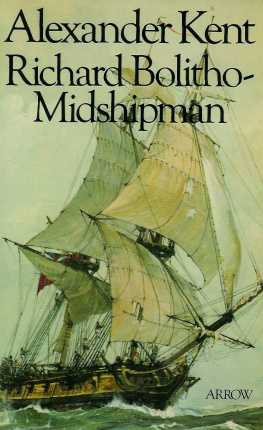Alexander Kent
The Darkening Sea
(Bolitho 22)
To Mike and Bee Hartree, with our love
The lights begin to twinkle from the rocks:
The long day wanes: the slow moon climbs: the deep
Moans round with many voices. Come, my friends,
Tis not too late to seek a newer world.
Push off, and sitting well in order smite
The sounding furrows; for my purpose holds
To sail beyond the sunset, and the baths
Of all the western stars, until I die.
Tennyson, "Ulysses'
The meandering track that ran around the wide curve of Falmouth Bay was just wide enough to allow passage to horse and rider, and only slightly less dangerous than the footpath which was somewhere beneath it. To the stranger or the foolhardy either could be hazardous.
On this particular dawn the coast appeared abandoned, its sounds confined to the cries of seabirds, the occasional lively trill of an early robin, and the repetitive call of a cuckoo which never seemed to get any closer. In places some of the cliff had fallen away, so that where the track ran closer to the edge it was possible to hear the boom of the sea against the jagged rocks below. Rarely still, it was never to be taken for granted.
There was a damp chill in the air but this was late June, and within hours the horizon would be hard and clear, the sea glittering with a million mirrors. The horse and rider rose slowly above a steep slope and paused like a piece of statuary or, like this bewitched coast, a vision which might suddenly vanish.
Lady Catherine Somervell tried to relax her body as she stared back above the drifting mist. They must have thought her mad at the big grey house below Pendennis Castle, like the stable boy who had snatched up a lantern when she had startled him out of sleep. He had mumbled something about calling the head groom or the coachman, but she had refused. As he had saddled Tamara, the powerful mare Richard Bolitho had found for her, she had felt the same sense of urgency, and a conviction which her rational mind could not dismiss.
She had dressed herself in the big room, their room, with the same driving desperation. Her long dark hair was only loosely pinned about her ears, and she wore her thick riding skirt and one of Richard's old sea-going coats, which she often used on her cliff walks.
She had felt the gorse and bushes dragging at her skirt as Tamara had moved purposefully along the track; had tasted the sea. The enemy as Bolitho had once called it, his voice so bitter in one of those rare, private moments.
She stroked the horse's neck to reassure herself. A fast packet had brought news to Falmouth from the Caribbean. The English fleet and a considerable force of soldiers and marines had attacked Martinique, the main base for French naval operations there. The French had surrendered, and most of their activities in the Caribbean and on the Main had ceased.
Catherine had watched the faces of the people in the square when the news had been read out by a dragoon officer. Most of them would be unaware of the importance of Martinique, a thorn in Britain 's side for so many years, or even know where it was. There was little enthusiasm and no cheers either, for this was 1809, and four years had passed since the death of Nelson, the nation's darling, and the battle of Trafalgar which must have seemed to many the final stage of this endless war.
And with the packet had come a letter from Richard. He had written in great haste, with no time for details. The fighting was over and he was quitting his flagship, the ninety-four gun Black Prince, and was under orders to return to England with all haste. It did not seem possible even now. He had been absent for little more than nine months. She had steeled herself for a much longer period, two years or even three. She had existed only for his letters, and had thrown herself into helping Bryan Ferguson, Bolitho's one-armed steward. With every young man pressed into the fleet, unless they were lucky enough to hold a protection, it was difficult to keep the farm and estate working. There were several crippled men who had once served with Bolitho, men he now cared for much as he had tried to do at sea. Many landowners would have thrown them on the beach, as Richard called it, left them to beg from those they had fought to protect.
But all that mattered now was that he was coming home. First to Falmouth. She shivered as if it were winter. The rest could wait until he was here, in her arms.
She had read his short letter so many times, trying to guess why he had been required to hand over his command to another flag officer. Valentine Keen had also been replaced, and perhaps was intended for promotion. She thought of Keen's young wife and felt a touch of envy. She was with child; it must be due, born even. But Keen's well-meaning family had taken Zenoria to one of their fine houses in Hampshire. She had been the only girl Catherine had found it easy to talk with. Love, suffering, courage they had both experienced their extremes in the past.
There had been a very unexpected visitor after she had received Richard's letter. Stephen Jenour, his flag lieutenant and the newly appointed commander of a smart brig, Orcadia, had come to see her while his command was taking on stores in Carrick Roads: a different Jenour, not merely because of what he had endured in the open boat after the wreck of the Golden Plover, but matured also by a sense of loss. His own command, taken at Richard Bolitho's insistence after returning to England with their captured French prize, had also removed him from daily contact with the superior he respected, loved even, more than any other yet encountered in the course of his young life.
They had talked until the shadows were deep in the room and the candles had been guttering. He had told her of the battle in his own words, as Bolitho had requested. But as he had spoken she had heard only Richard, the men who had fought and died, the huzzas and the suffering, victory and despair.
What would Richard be thinking on his way home? Of his Happy Few, his band of brothers? There were even fewer now with Jenour gone.
She nudged the horse and Tamara moved forward again, her ears twitching towards the sea, the continuous murmur against the rocks. The tide was on the make. She smiled. She had been listening too long to Richard and his friends, and the fishermen who brought their catch up to Flushing or into Falmouth itself.
Always the sea was there. Waiting.
She strained her eyes towards it now but there was still too much mist, and not enough light to see the headland.
She thought of her ride here. The countryside stirring itself, the smell of freshly baked bread, of foxgloves and the wild roses in the hedgerows. She had seen few people about but had sensed their presence: very little was missed by these folk whose families had known the Bolithos from generation to generation, and the men who had gone year after year to die in forgotten campaigns or great sea-battles. Like the portraits on the walls in the old house, watching her when she had gone up alone to bed, measuring her still.
At least Richard would have had his beloved nephew Adam with whom to share the days at sea. He had finished his letter by revealing that he would be sailing independently in Adam's own command. She allowed her mind to stray once more to Zenoria, and then to Zenoria and Adam. Was it merely imagination, or that warning instinct which had been born out of her own early years?
She reined the horse around, her fingers groping for the small carriage pistol she always carried. She had not even seen or heard them. Relief surged through her as she saw the dull glint of their buttons. They were coast guards
One of them exclaimed, "Why, Lady Somervell! You gave us a start! Toby here thought some gennelmen were runnin' a cargo up from the beach! "




